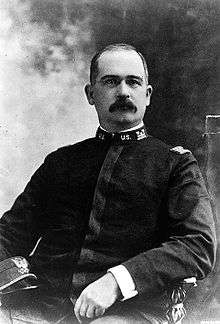Thomas Lincoln Casey Sr.
| Thomas Lincoln Casey Sr. | |
|---|---|
 Thomas Lincoln Casey | |
| Born |
May 10, 1831 Sackets Harbor, New York |
| Died |
March 25, 1896 (aged 64) Washington, D.C. |
| Place of burial | North Kingstown, Rhode Island |
| Allegiance |
Union |
| Service/branch |
Union Army |
| Years of service | 1852–1895 |
| Rank |
|
| Commands held | Chief of Engineers |
| Battles/wars | American Civil War |
| Relations | Silas Casey (father) |
Thomas Lincoln Casey Sr. (May 10, 1831 – March 25, 1896) was a soldier and engineer.
Biography
Thomas Lincoln Casey was a noted military and civil engineer of the late 19th Century. He served as Chief of Engineers for the United States Army Corps of Engineers and oversaw the completion of the Washington Monument. He was the son of Major General Silas Casey who led the assault on Chapultepec Castle in the Battle of Chapultepec in the Mexican-American War and also served as a major general in the American Civil War.
Casey was born in Sackets Harbor, New York. He graduated first in his class from West Point in 1852 and was assigned to the Corps of Engineers. He taught engineering at West Point from 1854 to 1859. During the American Civil War he oversaw construction and improvements to coastal fortifications in Maine, completing the massive Fort Knox on the Penobscot River as well as work on Fort Preble, Fort Scammel and Fort Gorges near Portland.
Casey headed the division the Office of the Chief of Engineers responsible for military engineers, equipment, and fortifications. From 1877 to 1881, Casey headed the Office of Public Buildings and Grounds, District of Columbia. He had design responsibility for the State, War, and Navy Building, which is now the Eisenhower Executive Office Building. He re-designed and completed the Washington Monument after problems arose with the original design.
He was promoted to brigadier general as assigned as Chief of Engineers on July 6, 1888. He retired from the Army on May 10, 1895 having reached the mandatory retirement age of 64.
He worked on the design of the Thomas Jefferson Building, which houses the Library of Congress; it was nearly completed when he died suddenly on March 25, 1896. Upon his death, responsibility for the project passed to his son, architect Edward Pearce Casey. Another son, Colonel Thomas Lincoln Casey Jr., had a 33-year career in the U.S. Army Corps of Engineers and was a noted entomologist.
Casey was a member of the National Academy of Sciences and an officer of the Legion of Honor of France. In 1882 he succeeded his father as a member of the Massachusetts Society of the Cincinnati. He was also a First Class Companion of the Military Order of the Loyal Legion of the United States.
Thomas Lincoln Casey was buried with his father and other family members at the Casey Farm in Saunderstown, Rhode Island.[1]
Projects
Casey's engineering projects included:
- Fort Gorges
- Fort Knox, Maine
- Fort Scammel, Maine
- The Washington Monument
- The Library of Congress
- The Eisenhower Executive Office Building
References
- ↑ Historic New England
This article contains public domain text from "Brigadier General Thomas Lincoln Casey". Portraits and Profiles of Chief Engineers. Archived from the original on March 6, 2005. Retrieved May 12, 2005.
External links
| Military offices | ||
|---|---|---|
| Preceded by James Chatham Duane |
Chief of Engineers 1888–1895 |
Succeeded by William Price Craighill |